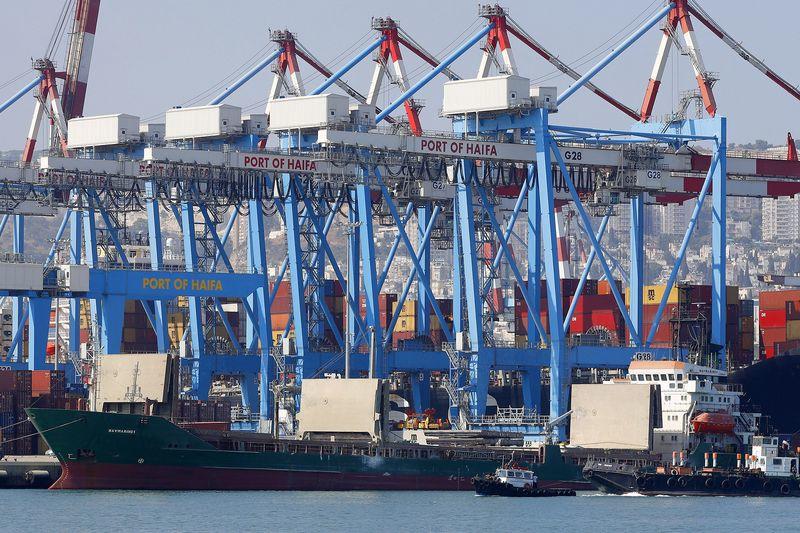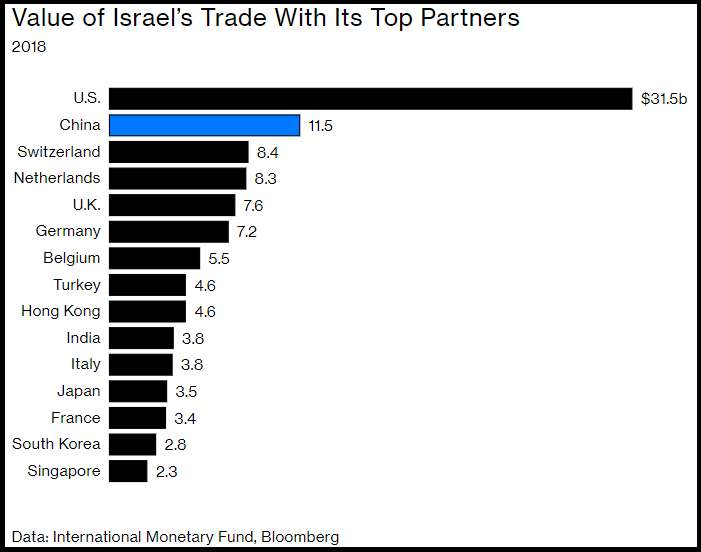US Pressures Israel To Drop China ‘Belt And Road’ Investments
As China executes on its “Belt and Road” global trade scheme, more than 130 countries who have either committed to or expressed interest in the $600 billion initiative have been hard at work expanding their infrastructure to accommodate Beijing’s ambitious plan.

And while President Trump has been pounding the table in an ongoing US-China trade war, progress made on Belt and Road threatens to reduce US leverage over Beijing – putting US allies such as Israel, which extended a 25-year offer for the operation of the Haifa terminal to state-controlled Shanghai International Port Group – in a tricky position, according to Bloomberg‘s Ivan Levingston.
With national elections approaching on Sept. 17, Prime Minister Benjamin Netanyahu can ill afford to alienate the Trump administration on its signature international issue. Trump has endeared himself to Netanyahu by transferring the U.S. Embassy from Tel Aviv to Jerusalem and recognizing Israeli sovereignty in the disputed Golan Heights. Netanyahu reciprocated by naming a new Golan settlement after Trump and praising the American leader for, among other things, quitting the Iranian nuclear accord. “Over the years, Israel has been blessed to have many friends who sat in the Oval Office, but Israel has never had a better friend than you,” Netanyahu told the president during a March trip to the White House. An October Pew study found that 69% of Israelis had confidence in Trump’s performance as president, and many of Netanyahu’s campaign ads prominently feature the U.S. leader. –Bloomberg
Of note, China is currently Israel’s second-largest trading partner with around $11.5 billion in annual transactions in 2018, according to the report.
Meanwhile, the United States has pressed Israel to create a buffer with China in the interest of national security – which would look something like the Committee on Foreign Investment in the US (the same one that rubber-stamped Russia’s purchase of 20% of America’s Uranium).
“Israel and Israeli companies are quickly coming to the realization that it’s going to be difficult to sustain business as usual in work with China while keeping the United States as the primary partner,” said Daniel Shapiro, Barack Obama’s US ambassador to Israel.
Economic ties between Israel and China date to 1979, before China had formally recognized the Israeli state. Israeli billionaire Shaul Eisenberg brokered a secret meeting between representatives that led to Israeli arms sales to China. Diplomatic relations were formalized in 1992. In the early 2000s, the U.S. successfully pressured Israel to cancel a sale to China of its Phalcon radar system, as well as parts for the armed Harpy drones it had already sold them. But the Sino-Israeli relationship recovered. In the past few years, Chinese investment in the country’s tech sector has increased sharply, reaching about a quarter of all funds raised by Israeli tech companies in the third quarter of last year, data from the Israeli high-tech tracker IVC Research Center show. –Bloomberg
Netanyahu as recently as October hailed Israel and China’s relationship as a “natural partnership” while hosting Chinese VP Wang Qishan at a meeting of the Israel-China Joint Committee on Innovation Cooperation in Jerusalem – which sparked tremendous backlash among US officials, including just-fired national security adviser John Bolton and his ‘friend,’ Secretary of State Mike Pompeo – who threatened to limit how much intelligence the US shares unless they establish boundaries with China.
The Haifa seaport in particular has been a cause for concern because of its proximity to a harbor used occasionally by the U.S. Navy’s Sixth Fleet. Although the two facilities are separated by a breakwater and an older commercial port, the U.S. Senate passed a defense spending bill that includes a provision expressing “serious security concerns” about the development. Zhan Yongxin, China’s ambassador to Israel, pushed back with an op-ed in Israeli daily Haaretz in August, arguing that “the win-win cooperation between China and Israel” ought to be “respected.” –Bloomberg
“Using Chinese contractors to build some of our infrastructure is very important for Israel because there are very few infrastructure builders in the world,” said Netanyahu’s top economic adviser, Avi Simhon. “If we have additional competition for these projects, that could save us many billions of dollars.”
Because of course, saving billions in the near-term is more important than screwing over your closest ally in the long term!
Bloomberg‘s bottom line: Whether or not Netanyahu prevails in his bid for reelection, Israel’s economy will remain dependent on China’s continued investment, potentially alienating the U.S.
Tyler Durden
Thu, 09/12/2019 – 21:25
via ZeroHedge News https://ift.tt/2NcDzZp Tyler Durden
